For a town that has just caused a genuine political earthquake – while also setting a new record for electoral nano-margins – Runcorn seems remarkably underwhelmed.
The rest of Britain, and particularly that part of it which inhabits the much-derided ‘Westminster bubble’, might still be in a state of shock.
Those who delivered victory for Reform here in Thursday’s by-election shrug and tell me that there was no alternative.
Even the ones who voted for another party – or, in many cases, did not vote at all – are neither surprised nor terribly upset.
Labour diehards manage a smile as they acknowledge that the Government probably did deserve a good kick – and got one.
The aftershocks of this quake would continue to reverberate across the country into yesterday evening as Nigel Farage marshalled his Reform battalions in his native Kent for a victory rally.
Here in Runcorn, I arrive to find most people merely bemused by all the attention.
‘Well, it makes a change because no one takes any notice of us,’ says retired ICI worker Wilf Jackson.
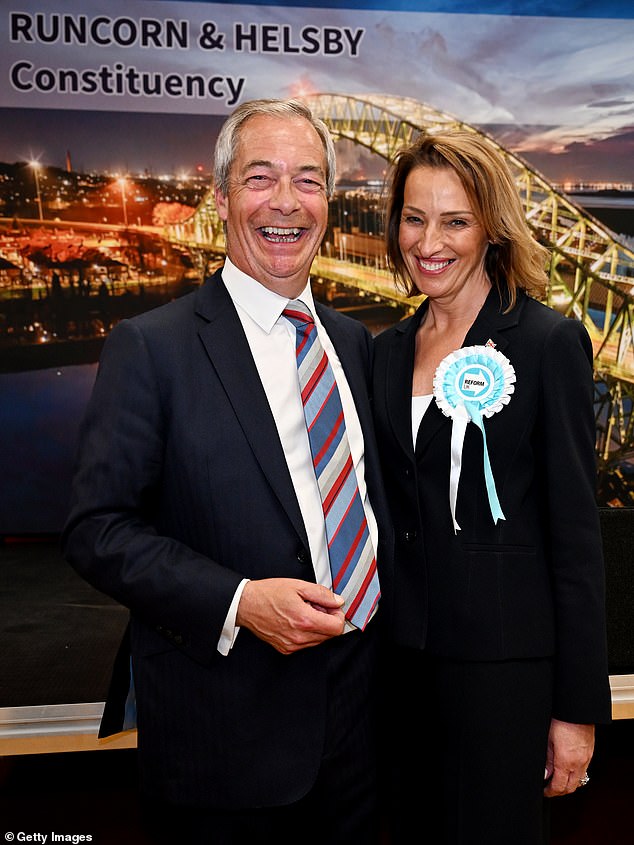
For a town that has just caused a genuine political earthquake – while also setting a new record for electoral nano-margins – Runcorn seems remarkably underwhelmed, writes Robert Hardman. Pictured: Nigel Farage (L) and Sarah Pochin of the Reform Party celebrate as she is declared the winner of the Runcorn and Helsby by-election

The rest of Britain, and particularly that part of it which inhabits the much-derided ‘Westminster bubble’, might still be in a state of shock. Those who delivered victory for Reform here in Thursday’s by-election shrug and tell me that there was no alternative, Hardman says
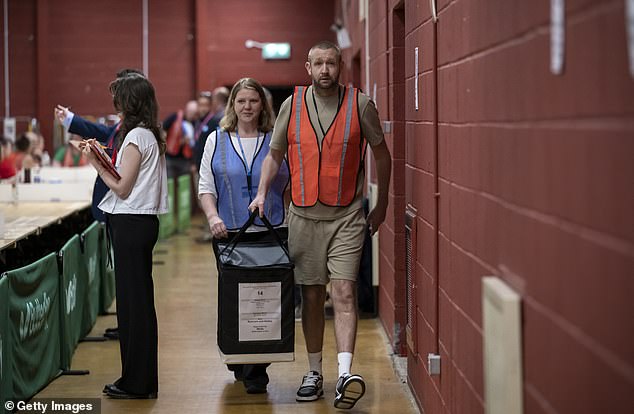
Even the ones who voted for another party – or, in many cases, did not vote at all – are neither surprised nor terribly upset. Labour diehards manage a smile as they acknowledge that the Government probably did deserve a good kick – and got one, says Hardman
‘Everything always gets given to that lot.’ I assume by ‘that lot’ he means Liverpool – or else London.
‘No, Widnes! We’ve been waiting for a pool since 1960 and they’ve had three in that time.’ Local rivalry is clearly deep and raw.
His point is neatly underlined by the fact that the declaration of this colossal result did not even take place in the constituency.
With nowhere suitable in Runcorn, the votes were counted on the other side of the Mersey at the DCBL Stadium, home of Widnes Vikings Rugby League Club.
Runcorn’s lack of civic amenities like a leisure centre, cinema or theatre proved a major theme on the by-election trail.
It is that same perception of a ‘two-tier’ state somehow favouring other people at one’s own expense which seems to lie behind so many of yesterday’s upheavals in council and mayoral elections across England.
I hear it time and again in Runcorn’s old-fashioned high street, which still boasts a hat shop and an independent butcher.
‘I’m not political but there’s nothing wrong with a bit of change,’ says Danny Shaw at Shaw’s Butchers. ‘Labour’s done nothing to help businesses like mine.’

Pictured: Farage celebrating as Reform Party candidate Sarah Pochin is declared the winner of the Runcorn and Helsby by-election Runcorn
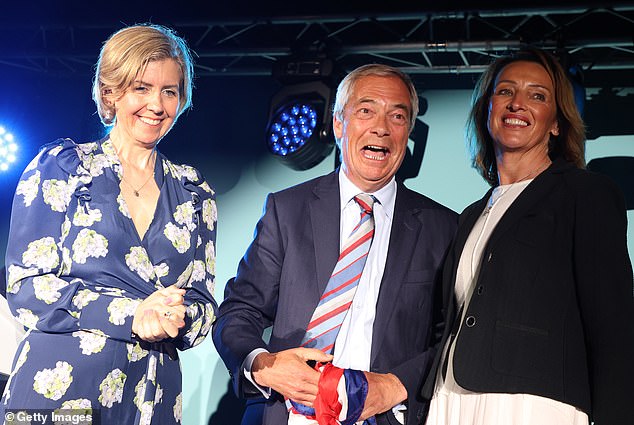
The aftershocks of this quake would continue to reverberate across the country into yesterday evening as Nigel Farage marshalled his Reform battalions in his native Kent for a victory rally. Pictured: Farage with Dame Andrea Jenkyns (L), and Sarah Pochin (R) as Reform UK celebrate local election victories in Paddock Wood

Pictured: Farage celebrating Reform’s historic local election victories in Paddock Wood
It’s the same in the other bit of Runcorn, the post-war ‘new town’ designed by a communist municipal planner in the Sixties.
Its centrepiece is Runcorn Shopping City, the last word in ‘space age’ retail sophistication when it was opened by the late Queen in 1972.
Today, it is a faded and forlorn collection of cafes, discount stores and empty units.
The newest outlet to open here is the campaign headquarters of Sarah Pochin, the new MP.
It seems rather ironic that here, at the very epicentre of this week’s tectonic shift, there is not a single light on and the doors are closed.
I find a couple of pensioners sitting on a bench outside, delighted by the result. ‘I used to vote Labour,’ says Pam, ‘but it’s Reform from now on. At least they will deal with all this immigration.’
Having been up all night, the new MP is grabbing some sleep before heading down to join the Faragefest in Kent.
Until this by-election, she was a local magistrate who had put politics behind her after a spell (as a Tory) on Cheshire East Council.
Before that, the mother of two grown-up sons and Loughborough University graduate had worked in business across Europe.
As she told me during the campaign, she was used to moving all over the country having grown up as an Army child (Dad was in ‘the Glosters’).
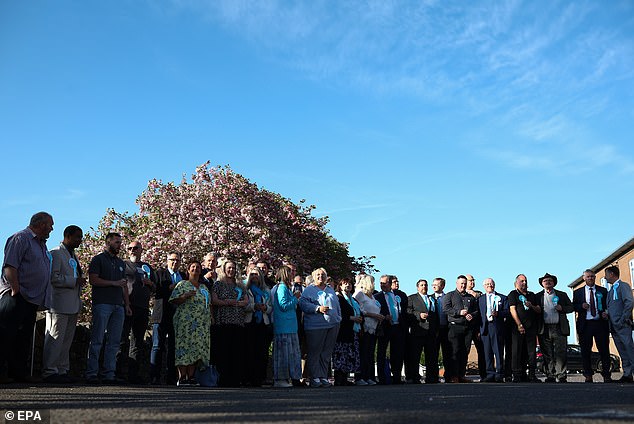
Pictured: Reform UK councillors and supporters attend a post-election event at the Staffordshire County Showground in Stafford, Britain, 02 May 2025
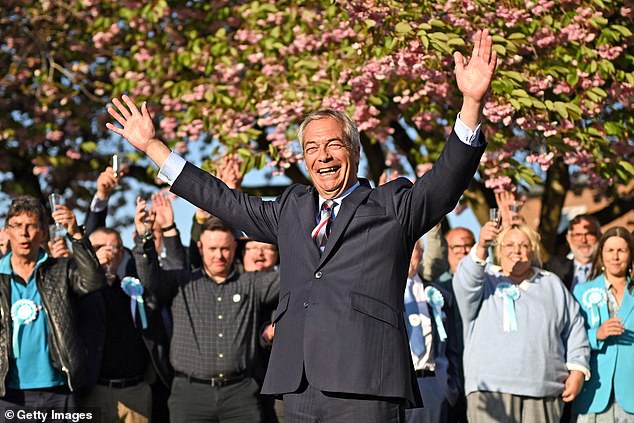
Nigel Farage cheers while addressing supporters and the media at Staffordshire County Showground after Reform won control of Staffordshire County Council winning 49 out of 62 seats available
Now she is on the move again, pronto, to begin a new career on Tuesday as one fifth of Reform UK’s parliamentary party.
Later on, I talk to some of her team who are still coming to terms with the fact that they have actually pulled this off.
‘We came into this with no local structure and no premises to take on a party that’s run the council here for decades,’ says one.
‘The campaign was already underway before we got the keys to the office.’ Given its obvious success, Mrs Pochin apparently intends to retain an office in the shopping centre.
Some of her supporters are irked by the tone of news reports that Reform won by ‘just’ six votes, pointing out that it was astonishing even to be in the running.
Runcorn was never a prime Reform target, as its polling in the Brexit referendum reveals.
While other once-safe Labour towns like Stoke or Sunderland delivered thumping great votes to leave the EU – and subsequently lurched to the Right –this place was evenly balanced over Brexit.
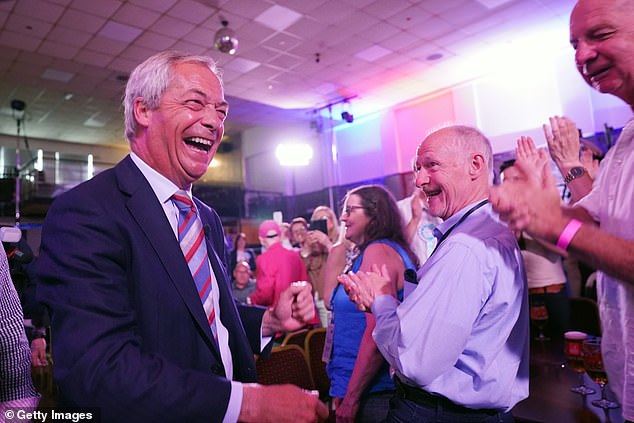
Pictured: Reform UK party leader Nigel Farage is seen celebrating with supporters after Reform UK took control of Durham County Council
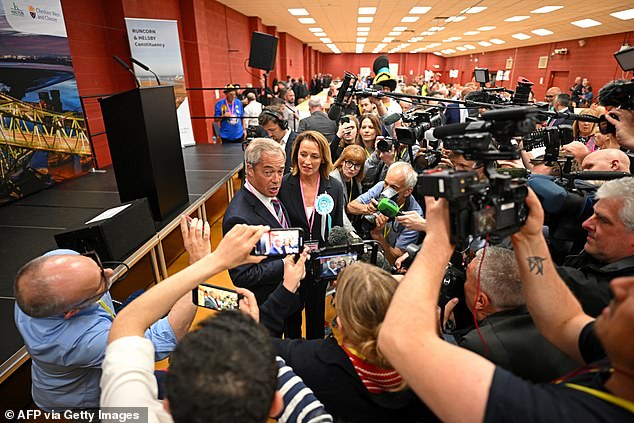
Nigel Farage (L), leader of the Reform UK party and Sarah Pochin (R), the party’s candidate, speak with the press as they celebrate her victory in the Runcorn & Helsby by-election at the DCBL Stadium
It sits on the Mersey, in the shadow of Liverpool, where Labour’s roots are deeper than anywhere else.
According to the House of Commons Library, of the five safest Labour seats in the land, four are in Merseyside.
All of which reinforces the significance of a result which warrants immediate induction to the by-election hall of fame.
Political nerds will be studying this one for years to come.
It was in this same region that Britain saw a similar seismic shift more than 40 years ago.
Back in 1981, Westminster was left reeling after the Crosby by-election when a new political force, the Social Democrats, beat both the Tories and Labour to assert themselves as a new party of government.
The difference in that case was that they were already part of the political establishment, led by a band of distinguished centre-Left moderates. Their candidate, Shirley Williams, was a former Labour Cabinet minister.
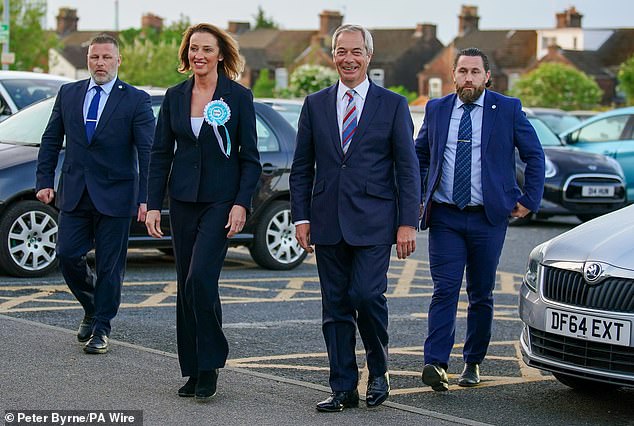
Reform UK candidate Sarah Pochin and party leader Nigel Farage (second right) arrive at the DCBL Halton Stadium ahead of the result of the Runcorn and Helsby by-election
The SDP represented a rearrangement of the existing political furniture. Reform’s win feels more like a bunch of outlaws storming the gates.
I head out of Runcorn, along rural roads which are a reminder that the constituency has a significant rural hinterland.
I doubt that Labour could rely on a single farming vote (on my train to Runcorn, I encountered a group of agricultural students on their way to a Young Farmers’ conference in T-shirts declaring: ‘Be like Starmer! F*** a Farmer!’).
I visit Frodsham, the opening scene of this extraordinary story. It was here, outside the Golden Lion pub, that former MP Mike Amesbury was filmed battering a constituent after a night on the tiles last October, thus triggering this by-election.
‘Brilliant news, isn’t it. Labour have ruined this country and now they’ve been punished,’ says Colin Jones, outside his memorabilia shop.
So was that his first vote for Reform? ‘I didn’t vote! I don’t like Farage one bit. I just think Labour are a disgrace.’
Former office worker John Riley is wearing a turquoise shirt which might suggest his voting intention.
‘I’m glad you noticed,’ he chuckles. ‘I’ve put it on specially.’
Noticing a journalist with a notebook, a man puts down his pint at the Bear’s Paw and bounds up to me.
‘It’s excellent news and it’s just the start,’ says Christian, an ex-soldier after 27 years in the Royal Signals. ‘I’m not a member. I’m not far-Right. But this country can’t cope with any more men of fighting age claiming to be refugees or children.’
It is also an election which will forever be cited as proof that every last door-knock and leaflet really does count.
‘I don’t care if people say we won by “just six votes”,’ says Reform’s Gawain Towler. ‘It’s been great for grass-roots party morale because even a volunteer who helped out for a couple of hours can say, ‘I made the difference.’
Back in the centre of Runcorn, Sandra Colgan, a lifelong Labour voter (‘except for Corbyn’) says something similar.
‘It only needed a handful more of us and we’d still have a Labour MP,’ she says, adding ruefully: ‘Maybe it’s just what we needed.’







